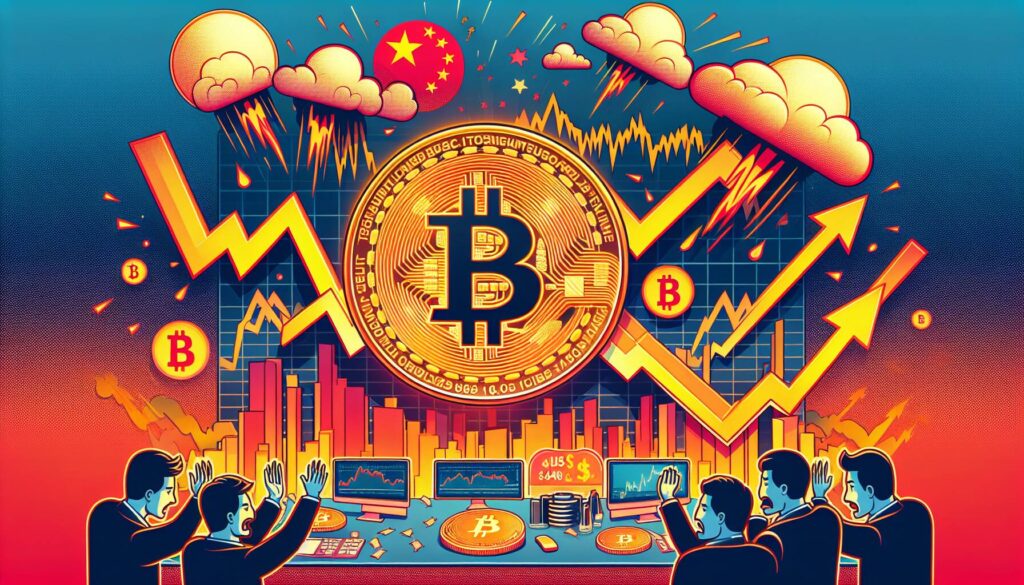Bitcoin has faced a notable decline, plummeting to $104,782, as a result of escalating tensions in the U.S.-China trade war. The situation has been intensified by former President Donald Trump’s recent threats of imposing a 100% tariff on all Chinese goods, a move that has sent shockwaves through global markets.
According to various reports, the ramifications of such tariffs could have profound impacts not only on trade but also on tech supply chains, especially concerning rare earth minerals, vital components in numerous electronic products. Analysts are pointing out that these minerals are already at the center of Trump’s escalating rhetoric against China, indicating the broader implications for sectors reliant on these resources.
“Trump’s renewed tariff threats have left exporters scrambling, as they race against the clock to adjust to potential new trading conditions,” noted a report from the South China Morning Post.
The effects were immediate and stark in the financial markets, where the Dow Jones Industrial Average fell by 800 points, marking the worst day for the S&P 500 and Nasdaq since April. This bear market sentiment has raised concerns among investors following Trump’s reinvigorated stance on trade, which some are interpreting as a return to confrontational policies.
Overall, as Bitcoin continues to feel the strain of geopolitical strife, the interplay between international trade policies and cryptocurrency values remains an important narrative for both investors and market watchers alike.

Impact of US-China Trade War on Bitcoin and Markets
The escalating tensions between the US and China have significant implications for financial markets and cryptocurrencies like Bitcoin. Here are the key points:
- Bitcoin Decline: Bitcoin’s value has dropped to $104,782, reflecting market volatility amid geopolitical tensions.
- Trump’s Trade War Threats: Trump has intensified his stance against China, contributing to economic uncertainty.
- Rare Earth Minerals: Central to Trump’s threats, these minerals are vital for various technologies, creating potential supply chain issues.
- Tariff Concerns: Trump’s 100% tariff threat has exporters rushing to adapt, impacting trade relations and costs.
- Stock Market Reaction: Major stock indices have seen significant declines, with the Dow dropping 800 points, indicating investor anxiety.
- Geopolitical Tensions: Ongoing conflicts suggest a shift in US-China relations that may lead to a long-term impact on global economies.
These points illustrate how geopolitical events can directly influence financial markets, affecting investments, trading strategies, and overall economic stability for individuals and businesses alike.
Market Turbulence: The Ripple Effects of Trump’s Trade War on Bitcoin and Stock Markets
The recent news surrounding Bitcoin’s substantial decline to $104,782 coincides with a critical escalation of the US-China trade conflict, primarily driven by Trump’s aggressive tariff threats. This backdrop not only creates significant volatility within cryptocurrency markets but also reverberates through traditional stock exchanges, evident from the Dow’s alarming drop of 800 points and the S&P 500 and Nasdaq experiencing their most tumultuous trading day since April.
The comparative advantage for Bitcoin during times of economic uncertainty typically rests on its status as a hedge against inflation and market instability. However, in this scenario, the adverse economic sentiment has overshadowed its perceived safety, leading to a downward trend. Additionally, with Trump’s hammering tariffs and trade implications linked to rare earth minerals—critical components in technology and manufacturing—the overall outlook for technology stocks has also soured. Companies heavily reliant on Chinese exports, like certain tech giants, may face declining stock values, thereby impacting investors’ portfolios.
For day traders and investors who thrive on volatility, this news cycle could present unique opportunities to capitalize on the market’s erratic behavior. Conversely, long-term investors and exporters are likely to feel the pinch as uncertainty looms, potentially stalling growth and complicating supply chain logistics. The ripple effects of these geopolitical tensions are poised to create a divide between those who can quickly adapt to changing circumstances and those who may find themselves cornered by escalating operational costs and reduced consumer confidence.

















